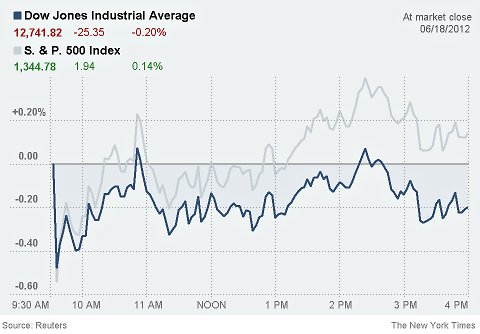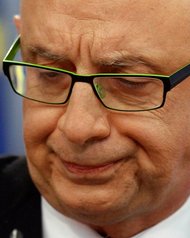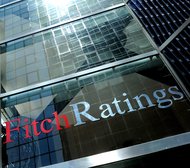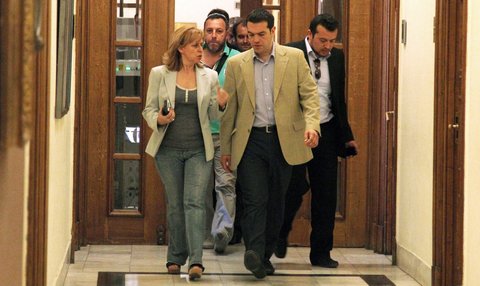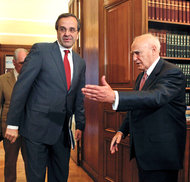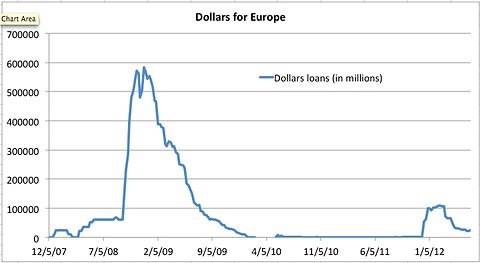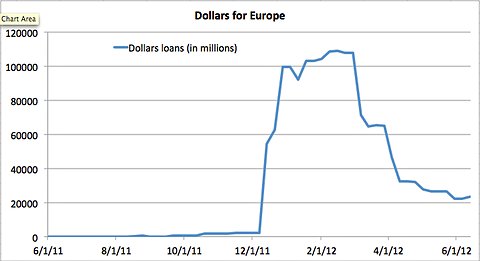As expected, the Fed’s policy-making committee voted to press ahead for now with its campaign to increase job creation. And its statement said nothing about how much longer it would continue to add $85 billion a month to its holdings of mortgage-backed securities and Treasury securities. But the Fed left its economic outlook basically unchanged, suggesting that the central bank still intended to reduce the volume of its purchases later this year.
The statement, issued after a regular two-day meeting of the Federal Open Market Committee, acknowledged the weak pace of growth during the first half of the year, which it described as “modest” rather than “moderate” — the words are synonymous in English but distinct in the Fed’s carefully calibrated lexicon, suggesting an even more lackluster economic performance. But it maintained the Fed’s forecast that “economic growth will pick up from its recent pace” in the coming months, driving job creation.
The statement also repeated language first introduced after the Fed’s previous meeting, in June, that “the committee sees the downside risks to the outlook for the economy and the labor market as having diminished since the fall,” when the Fed began this latest push aimed at increasing the pace of growth.
Analysts said they expected the committee to cut back at its next meeting in mid-September. Dean Maki, chief United States economist at Barclays Capital, said the statement was “on the dovish side” because of its references to slower growth, rising mortgage rates and low inflation. Nonetheless, he added, “We continue to expect the F.O.M.C. to taper the asset purchase program in September, provided that the next two employment reports are reasonably strong.”
The committee had little time to grapple with the implications of the latest economic data. The government announced earlier Wednesday that the economy expanded at an annual rate of 1.7 percent in the second quarter, better than economists had expected but below the pace that Fed officials regard as necessary to create enough jobs to bring down the unemployment rate.
The Fed repeated its stark assessment that “fiscal policy is restraining economic growth.” It also noted that “mortgage rates have risen somewhat,” a new check on the economy that is at least partly of the Fed’s own creation.
The average interest rate on a 30-year fixed-rate mortgage rose to 4.37 percent in July from 3.54 percent in May, according to a survey conducted by Freddie Mac. But that increase is only partly the result of investor uneasiness about the Fed’s plans; it also reflects an improved economic outlook. And that improved outlook, in turn, is mitigating the impact of the rate increases.
David Hall, president of Shore Mortgage in Troy, Mich., said that the higher rates had cut into demand for refinancing, but that demand for mortgages to buy a home remained strong. “People understand the historical context, that these are still really low rates, and coupled with all the news about home values rising, there’s still a lot of excitement about buying,” he said. “That excitement has overshadowed the rate increases a little bit.”
The Fed has also become more concerned about the sluggish pace of inflation. Prices rose at an annual pace of just 0.8 percent in the second quarter, according to the Fed’s preferred measuring stick, a measure of inflation compiled by the Bureau of Economic Analysis — well below the 2 percent annual pace that the Fed considers healthy. Low inflation can cause problems, although Mr. Bernanke recently noted that the reasons were “hard to explain to your uncle.” The primary cause for concern is the risk that prices will begin to fall, which can plunge the economy into a debilitating cycle of deflation as prospective buyers wait for prices to fall even further.
James Bullard, president of the Federal Reserve Bank of St. Louis, chided his fellow officials for underplaying this risk at the committee’s June meeting. This time the Fed noted the risk in the statement but maintained its official view that the pace of price increases was likely to rise.

Article source: http://www.nytimes.com/2013/08/01/business/economy/fed-maintains-course-on-policy.html?partner=rss&emc=rss



